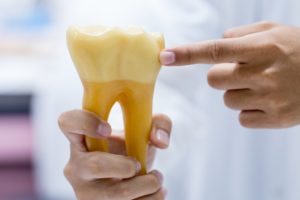 Tooth enamel is an amazing substance, in fact, it’s the hardest material in the entire body, even stronger than bone. This outer layer of the teeth keeps them healthy and protects them from the ever-present threat of harmful bacteria, acid, and food debris found in the mouth. However, recent research unveils genetics and the structure of tooth enamel could play a larger part than we think in how long is lasts. Read on to learn more about what the research says, and how you can help your enamel remain intact.
Tooth enamel is an amazing substance, in fact, it’s the hardest material in the entire body, even stronger than bone. This outer layer of the teeth keeps them healthy and protects them from the ever-present threat of harmful bacteria, acid, and food debris found in the mouth. However, recent research unveils genetics and the structure of tooth enamel could play a larger part than we think in how long is lasts. Read on to learn more about what the research says, and how you can help your enamel remain intact.
Breaking Down The Research
In September of 2019, several researchers from the Massachusetts Institute of Technology published a study in Nature Communications that closely examines the structure of tooth enamel and how that impacts its lifespan. They used advanced and high-quality imaging technology to develop a microscopic image of enamel so they could study it in detail.
By looking at their samples of tooth enamel, they were able to determine that it’s made up of “enamel rods” that consist of hydroxyapatite crystals. Upon even closer inspection, they were able to determine that the crystals are arranged in specific patterns, and depending on the sample they looked at, these arrangements can vary.
The Secret Structure of Tooth Enamel
After learning that tooth enamel can be made of various patterns of hydroxyapatite crystals, they wanted to find out whether certain arrangements were stronger or weaker than others. From here, they created a computer model of the patterns and put it through a variety of tests, such as a person chewing food. Certain patterns where the crystals were aligned at 45-degree angles to each other cracked easily. However, when they arranged the crystals slightly misaligned, they found that the cracks didn’t spread through the enamel.
From these tests, they were able to determine that a slightly misaligned crystal tooth enamel pattern is the most resilient because it was able to actively deflect cracks.
Preserving Your Tooth Enamel So it Can Last a Lifetime
Your tooth enamel can be impacted by a variety of factors, including how much fluoride you get when you’re younger and what types of foods you eat. Now we know that the microscopic structure of your enamel also plays a large role in its lifespan. Even though you can’t change your genetic makeup, there are some preventive tips you can take to help preserve your enamel and allow it to continue protecting your teeth. Some of these include:
- Keep up with your dental hygiene routine.
- Avoid acidic foods and beverages.
- Visit your dentist every six months for checkups and cleanings.
- Eat white dairy products.
- Protect your teeth from grinding and clenching.
With guidance from your dentist, you’ll be able to help restore lost tooth enamel to keep your teeth and gums protected from harmful oral bacteria. With these tips in your pocket, you can ensure that your natural teeth last for a lifetime.
About the Author
Dr. Rajiv Shekhadiya enjoys providing families in Carrollton with high-quality preventive dental care, including routine checkups and cleanings. By doing this, he’s able to prevent small oral health problems from developing into more severe issues down the road. He is passionate about creating a comfortable and relaxing environment so his patients look forward to visiting his practice. For questions or to schedule an appointment, visit Celebration Family Dental’s website or call 469-892-6647.
